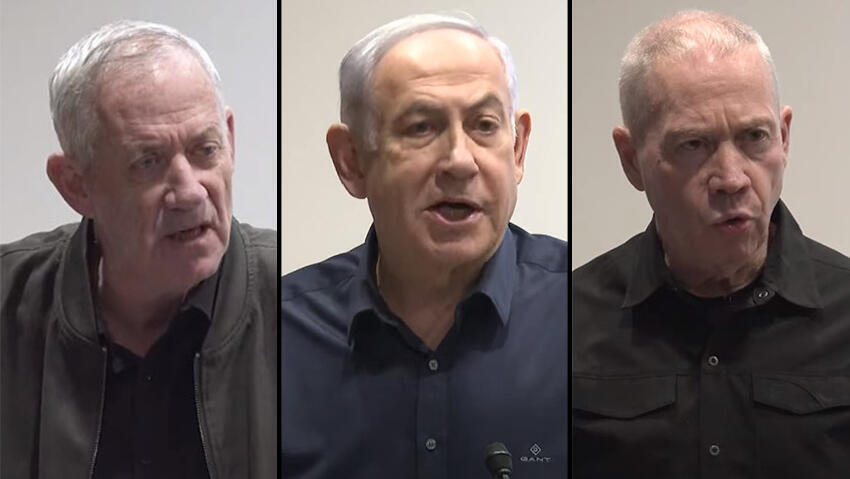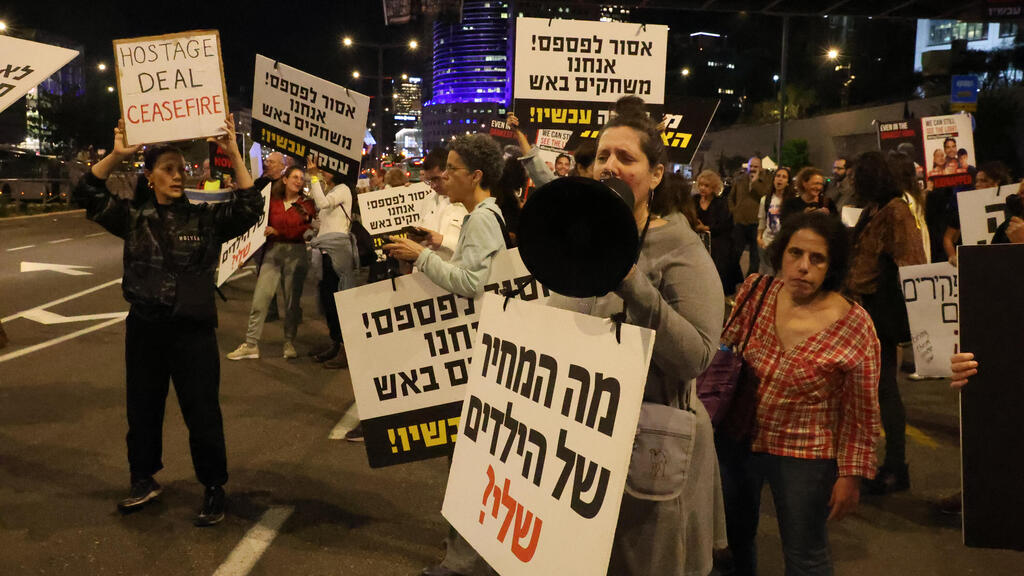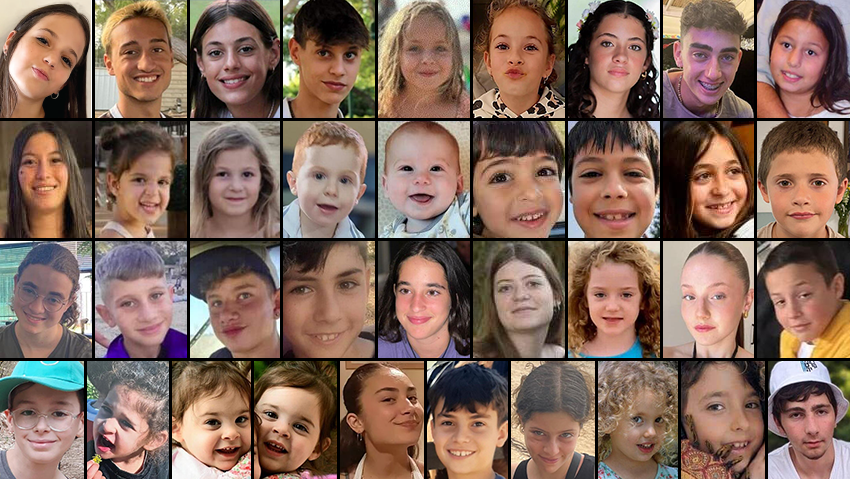Getting your Trinity Audio player ready...
Israel's Cabinet approved a hostage release deal early Wednesday morning after a more than 7-hour stormy session. Three government ministers from the Otzma Yehudit party headed by National Security Minister Itamar Ben-Gvir voted against the deal. The deal will see at least 50 hostages – children and mothers and elderly women – returned to Israel over four days in exchange for 150, or three times the number, Palestinian women and youths in Israeli prisons during a temporary cease-fire.
Government meeting in Tel Aviv
(Omer Miron, GPO)
Read more:
"The Israeli government is committed to the return home of all the hostages. Tonight, the government approved the outline for the first stage of achieving this goal, under which at least 50 hostages - women and children - will be released over four days, during which there will be a pause in the fighting. The release of every 10 additional abductees will result in an additional day of respite," the government said in a statement after the vote.
"The Israeli government, the IDF and the security forces will continue the war to return all the hostages, complete the elimination of Hamas and ensure that Gaza does not renew any threat to the state of Israel," according to the statement.
The decision by the government t would be limited to no longer than 10 days after the first group of women and children is freed. Palestinian prisoners whose release was approved but were not let out of jail until the release of the 50 hostages is complete, will remain in jail. 300 Palestinians were designated to be freed in exchange for the ultimate release of 100 hostages. The government decision also states that mothers and their children held hostage, would not be separated.
Among hostages to be released, a 3-year-old girl
Three Americans held by Hamas in Gaza since Oct. 7 attack are expected to be among at least 50 hostages to be released, a senior U.S. official said. The three include two American women and a 3-year-old girl whose parents were among the more than 1,200 people killed by Hamas. He added it was likely that more than 50 hostages, largely women and children, will be released once a pause in fighting takes hold.
U.S. President Joe Biden welcomed the deal. "Today's deal should bring home additional American hostages, and I will not stop until they are all released," he said in a statement.
The Qatari foreign ministry said on Wednesday Hamas and Israel have agreed on a humanitarian pause in Gaza hostilities for four days, subject to extension, the starting time of the which will be announced within the next 24 hours.
The pause, mediated by Qatar, Egypt and the U.S., includes the release of 50 civilian women and children hostages currently held in the Gaza Strip in exchange for the release of a number of Palestinian women and children detained in Israeli prisons, the ministry said in a statement.
"The number of those released will be increased in later stages of implementation of the agreement," the ministry said.
The Hamas terror group confirmed that a deal to release 50 hostages in exchange for 150 Palestinian prisoners held in Israel was reached. It would see a four day ceasefire that will allow freedom of movement from the northern part of the Gaza Strip to the south and six hours daily without aircraft presence over the area.
Initial releases of hostages are expected within 24 hours of the deal's announcement, with the first likely to be freed Thursday morning, the official said.
Under the agreement, Israel commits to refraining from aerial activity over the Gaza Strip for six hours each day during the initial cease-fire days, while Hamas attempts to locate the remaining captives.
Hamas insisted on this to prevent Israel from tracking their locations. The assumption in Israel is that some of the additional 20 captives include children and mothers not initially released. The list does not include foreigners without Israeli citizenship, and it's unclear what will happen if Hamas identifies fewer captives. The deal is also expected to include the release of elderly women.
During the discussion, Likud minister Dudi Amsalem said the government has a moral obligation to return the hostages.
"People were not kidnapped abroad. They were kidnapped here in Israel from their beds. There was a huge mistake here. Giant. That is why we must return them," he said.
At the start of the Cabinet meeting on Tuesday night, the members of the War Cabinet – Prime Minister Benjamin Netanyahu, Defense Minister Yoav Gallant and Minister Benny Gantz made dramatic statements, calling on the Cabinet to approve the agreement. In their statements, they admit that the outline of the agreement is different but called it a right and necessary step, despite objections from government ministers from the Jewish Power and Religious Zionism parties, as well as some lawmakers from the prime minister's Likud Party.
3 View gallery


Defense Minister Yoav Gallant, Prime Minister Benjamin Netanyahu, Benny Gantz
(Photos: Omer Miron, Elad Malka, Ministry of Defense)
The Religious Zionism party initially opposed the deal but after being reassured by the security officials, that the objectives of the war remain the same, and after taking time for consultations, they voted for the agreement.
Ben-Gvir and the ministers of Otzma Yehudit persisted in their refusal to approve the deal despite calls by others to show unity that would be seen by troops fighting in Gaza.
"The war is continuing and the war will continue until we achieve all of our goals – eliminating Hamas, returning all of our hostages and assuring that the day after Hamas, Gaza will no longer threaten Israel, that there will be no other element that supports terrorism, educates its children for terrorism and threatens the State of Israel. With G-d's help, we will do it and we will succeed – and together we will win," Netanyahu said in his remarks.
"Yesterday evening, I met, together with the members of the War Cabinet, members of the hostages' families. I listened closely to their plight. With shaking voices, sometimes in tears, they described the nightmare they are in. I told the dear families: 'Returning our hostages is a sacred and supreme task – and I am obligated to it together with my colleagues. As Maimonides says: There is no greater precept that redeeming captives. We will not relent in our efforts until we redeem them all, until we return them all, the boys and girls, the mothers and fathers, the young men and women, the elderly men and women, the male and female soldiers, all of them. In war there are stages, and in returning the hostages there are stages, but we will not relent until we achieve the absolute victory and until we bring them all back. This is my sacred duty, of all of us," Netanyahu also said.
The prime minister also said that he had spoken with US President Joe Biden "and I requested his intervention in order to improve the outline that will be presented to you. Indeed, it has been improved to include more hostages and at a lower cost. These talks have been productive."
Gallant said the operation in Gaza will continue both to eradicate Hamas and to bring all of the hostages home.
"As a result of the decision we made about a month ago to intensify the maneuver, to enter the territory and increase the pressure on Hamas, there is a chance to that this will lead to the release of hostages and this is a very important thing. The release of hostages in my eyes is first of all a value issue, a moral issue, an issue of commitment between the state, the government and the citizens," he said.
Gantz said the IDF's ground war helped bring about the agreement. "The attack that the IDF carried out together with all the security forces, is the basis for the blueprint for the release of hostages that was discussed today and will be presented here, and no less important than that is the basis for the continuation of the necessary operational efforts, also in the southern arena and possibly in other arenas. This outline is part of an overall concept of returning all the hostages and missing from this campaign … behind every hostage there is a name and there is a family."
He called the agreement "difficult and painful," but also the morally correct decision.
3 View gallery


Families of the hostages demonstrate outside of the Cabinet meeting in Tel Aviv
(Photo Shaul Golan)
During the Cabinet meeting, family members of the hostages demonstrated outside of the Kirya defense headquarters in Tel Aviv. Some complained that they had been kept in the dark about the impending agreement, while others were in a confusion of emotion as they waited to find out who would be the first to be released under the agreement.
"We were not informed of anything about it, nor of any other details of the deal. The families of the hostages have received all information about the deal only from the media. We are the last in line. Where is the special headquarters that was established for prisoners and missing people? And where is the man who is supposed to run it (Gal Hirsch)? No journalist should know anything about the deal before the families of the abductees," said relative Gil Dickman.
According to the latest information, there are 236 Israeli captives in the Gaza Strip, including 40 children and 13 mothers. Israel estimates that Hamas holds 80 captives who meet the criteria of the deal: children, mothers, and elderly women. In total, Israel is expected to transfer 240 prisoners to Hamas and commit to an eight-day cease-fire.
First published: 03:07, 11.22.23






